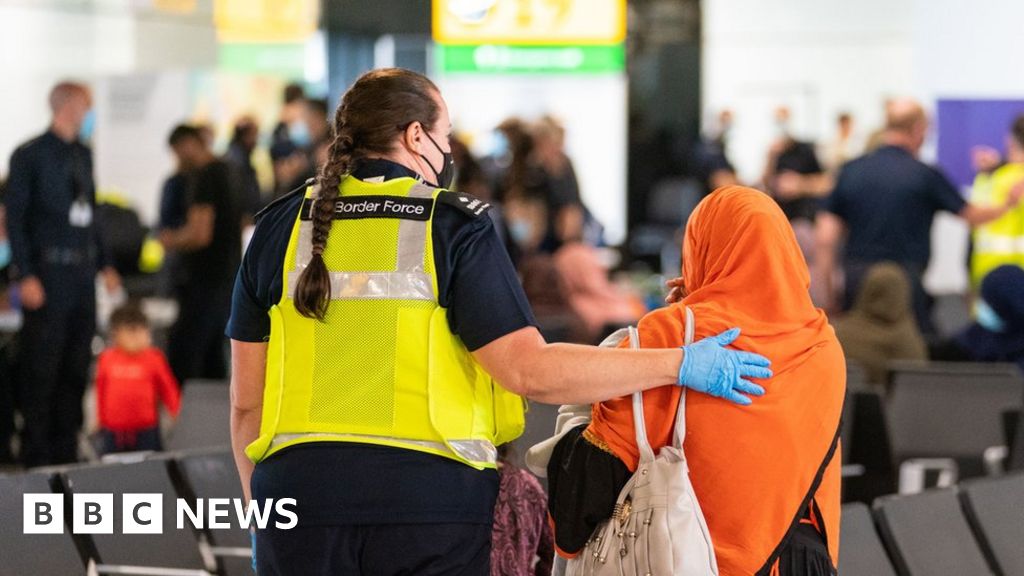- Dominic Casciani & Rick Faragher
- bbc news
In a major defeat for ministers, a judge has ruled that large parts of the UK government's illegal immigration laws breach human rights law and should not apply to Northern Ireland.
This is a revised version of the post-Brexit deal agreed between the UK and the EU last year.
The ruling raises serious questions about the long-term viability of the plan to deny hearings to some asylum seekers and send them to Rwanda.
In his judgment, Judge Humphreys also declared that parts of the law were not compatible with the European Convention on Human Rights. This is the final sanction from the British courts, which sends the unworkable bill back to the British Parliament for reconsideration.
The Illegal Migrants Act 2023 (IMA) is a key part of the UK government's plan to stop people seeking asylum from crossing the English Channel without prior authorization to arrive.
The plan was to enact a law that would require the Minister of the Interior to detain and remove anyone who arrived via that route, and then send them to Rwanda. That was until the Supreme Court ruled last year that the country was unsafe.
This key part of the IMA has been in limbo ever since, but it is widely expected to be implemented as it will facilitate the transfer of people to the African country.
Prime Minister Rishi Sunak said the NI tribunal's decision did not change the government's plans to send illegal immigrants to Rwanda.
teenage asylum seeker
Although the Windsor Framework primarily deals with trade issues, it also includes human rights elements. Britain has pledged not to water down human rights provisions under the Good Friday Agreement, the 1998 agreement that ended three decades of conflict in the northern region. Ireland is known as the Troubles.
The judge found that several elements of the law caused a “substantial” reduction in the rights enjoyed by asylum seekers living in Northern Ireland under the terms of the Good Friday Agreement.
“We find that there is a reduction in relevant rights in each area relied upon by the applicant,” he said.
Dr Tony McGleenan KC, representing the Government, suggested an appeal could be considered.
“We intend to accept the direction on the verdict and the position on further litigation will be clear,” he said.
The legal challenge was brought by the Northern Ireland Human Rights Commission and a 16-year-old asylum seeker from Iran living in Northern Ireland.
The Committee welcomes this judgment.
The group said it had filed the legal challenge on its own behalf “because of grave concerns about illegal immigration laws and their impact on asylum seekers in Northern Ireland”.
Going forward, he said, “we will fully consider the ruling and its impact.''
“Prime Minister: Nothing will distract us.”
Sunak said the court's decision does not change the government's plans to send illegal immigrants to Rwanda.
He said the government was working to open flights to Rwanda in the near future and “nothing can distract us from that or keep us on the schedule that I have set.”
He added: “We have to start flying to stop the boat.”
image source, Getty Images
Mr Sunak also said the government had been clear that its commitment to the Good Friday Agreement should not be interpreted to extend to issues such as illegal immigration.
“We will do everything possible to defend our position, including filing an appeal,” he said.
“Magnet for Asylum Seekers”
Democratic Unionist Party (DUP) leader Gavin Robinson said the ruling was “unsurprising” but “understood the government's absurd claim that the Rwanda Plan could apply equally to Northern Ireland”. We will completely blow it away.”
He said the government needed to “prevent rifts in immigration policy” between different parts of the UK.
Mr Robinson said the UK Parliament should have the ability to make decisions on immigration that are “applicable on a national basis”.
“If not, not only would it be unconstitutional, but Northern Ireland would become a magnet for asylum seekers trying to evade law enforcement,” he said.
The teenage asylum seeker was represented by Phoenix Law.
Immigration and Asylum Director Sinead Marmion welcomed Monday's ruling.
“The Good Friday Agreement has always been a beacon of human rights protection and hope.
“Today, the court has ensured that these rights apply to the whole community, including asylum seekers, through the Northern Ireland Protocol.”
Widespread attacks from critics?
The ruling is likely to be part of a wider attack from critics who say ministers have enacted a series of laws as part of their Rwanda strategy that breach basic protections for all refugees in the UK. expensive.
The First Sector Association, the trade union representing government officials, has already asked a judge to decide whether the Rwanda plan forces government officials to break the law.
Dozens of individual asylum seekers who have been told they could be sent to Rwanda are also being advised by lawyers whether they can sue.
Although the judgment addresses specific issues in NI, it raises questions about how the court will respond to what is likely to be a significant attack on the wider Rwanda program in the coming months.


